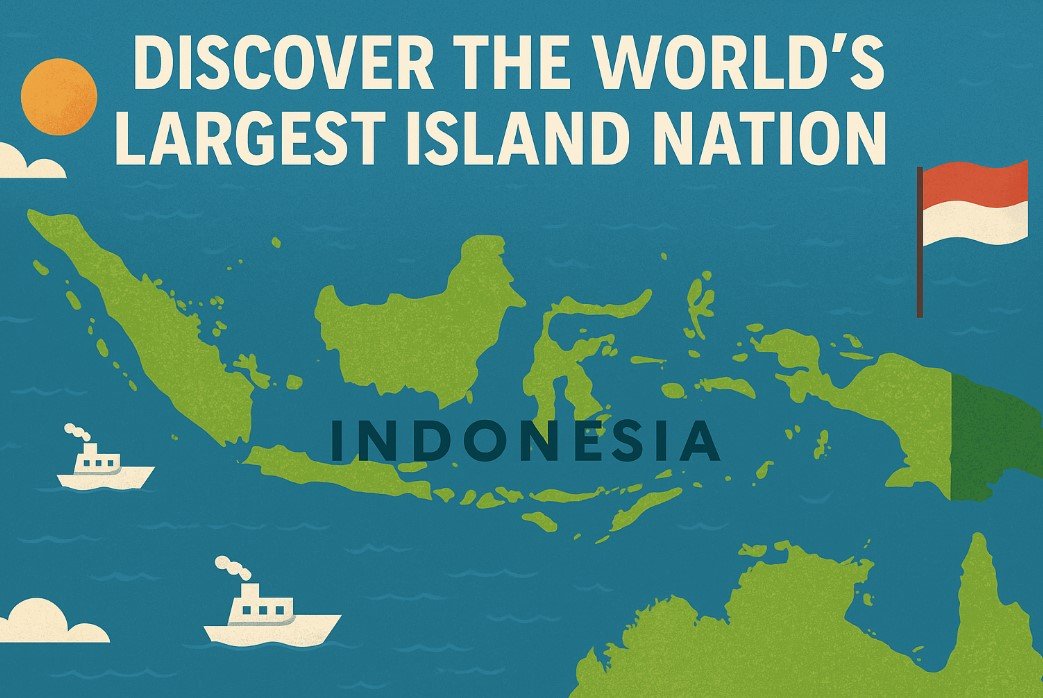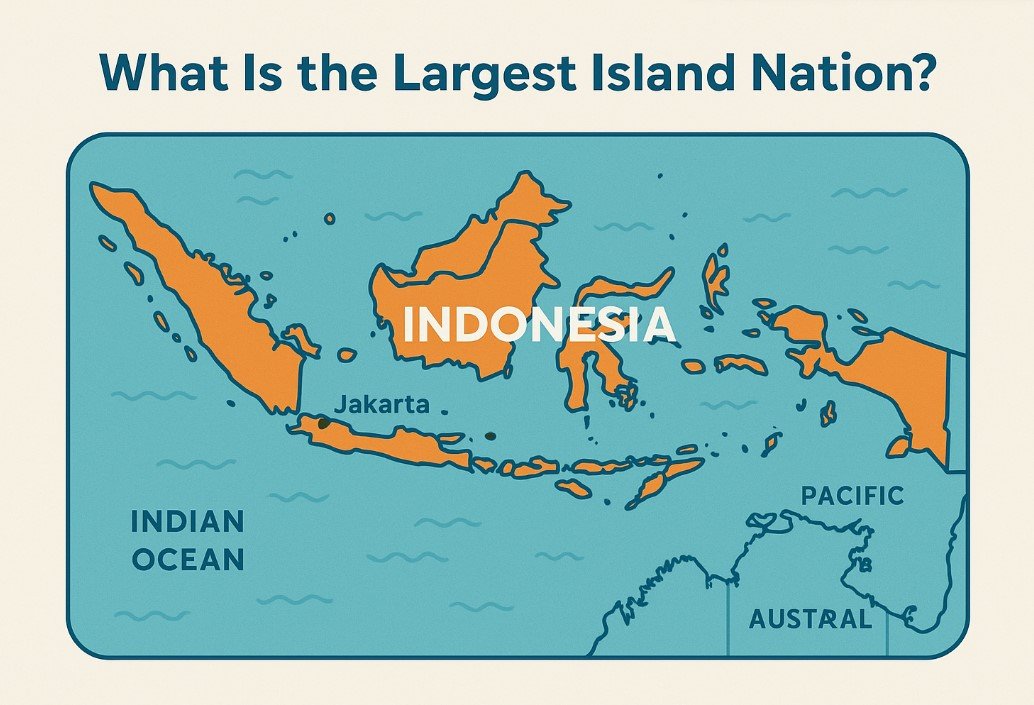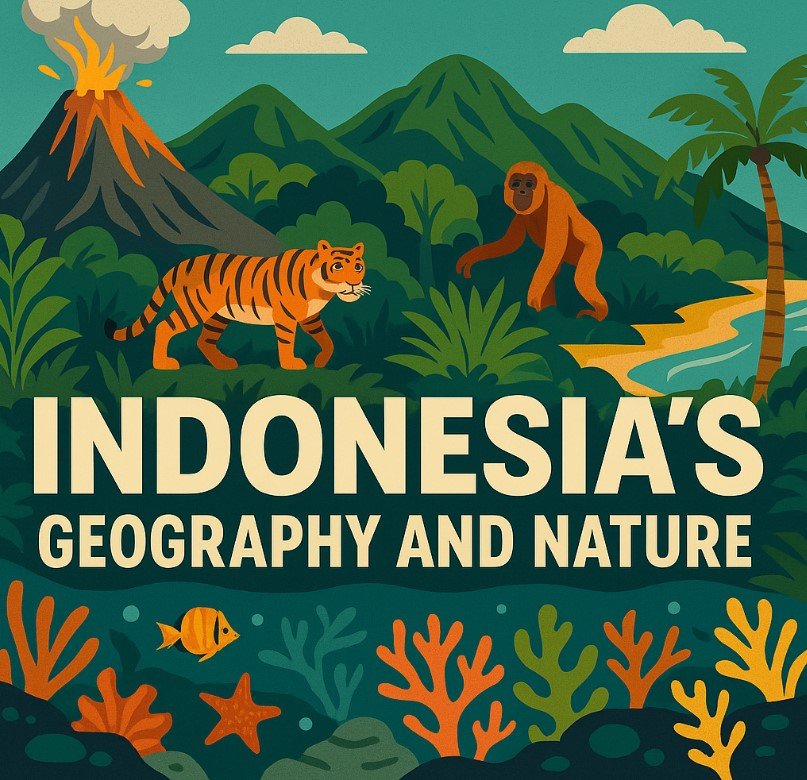Travel
Discover the World’s Largest Island Nation

When we think of island nations, we often imagine small tropical countries with beautiful beaches. But did you know that the largest island nation in the world is actually much bigger and more diverse than many people realize? In this blog post, we will explore the answer to the question, what is the largest island nation, and learn more about its geography, people, culture, and why it stands out among other island countries.
What Is an Island Nation?
An island nation is a country that is entirely made up of one or more islands. These countries are surrounded by water and have no direct land borders with other nations. Some well-known island nations include Japan, the Philippines, New Zealand, and the Maldives. These countries rely heavily on the ocean for trade, fishing, and tourism.
Island nations vary in size. Some are very small, such as Nauru or Tuvalu, while others are much larger and contain millions of people and thousands of square kilometers of land.

What Is the Largest Island Nation?
The largest island nation in the world is Indonesia. Located in Southeast Asia, Indonesia is made up of over 17,000 islands, making it the country with the most islands as well as the largest total area for an island nation. It covers more than 1.9 million square kilometers and is home to more than 270 million people.
Indonesia stretches across a vast area, from the Indian Ocean in the west to the Pacific Ocean in the east. Its main islands include Java, Sumatra, Borneo (shared with Malaysia and Brunei), Sulawesi, and Papua (shared with Papua New Guinea). Java is the most populated island and is home to the capital city, Jakarta.
Is Indonesia the Largest Island in the World?
No. While Indonesia is the largest island nation, the largest island in the world by land area is Greenland, which is a part of the Kingdom of Denmark. Greenland is not an independent country, so it is not considered an island nation. That’s why Indonesia holds the title when we talk about countries made up only of islands.
Indonesia’s Geography and Nature
Indonesia is located on the Pacific Ring of Fire, which means it has many volcanoes and is often affected by earthquakes. The country has more than 130 active volcanoes, the most of any country in the world. This has helped form its rich and fertile land, which is great for growing crops like rice, coffee, and spices.
The climate in Indonesia is tropical, with hot and humid weather all year round. It has two main seasons: the dry season and the rainy season. Rainforests cover large parts of the islands, and the country is home to many unique animals such as orangutans, tigers, elephants, and rare birds.
Indonesia also has beautiful coastlines and coral reefs. Places like Bali, Lombok, and the Raja Ampat Islands are popular travel destinations for people who want to enjoy nature, beaches, and marine life.

Culture and Language
Indonesia is known for its rich and diverse culture. It has hundreds of ethnic groups and more than 700 different languages spoken across the islands. The official language is Bahasa Indonesia, which is used in schools, media, and government. However, many people still speak their local languages at home and in their communities.
The culture of Indonesia is influenced by many different traditions, including Indian, Arabic, Chinese, and European. Religion also plays an important role. The majority of Indonesians are Muslim, but there are also Christians, Hindus, Buddhists, and people who follow traditional beliefs.
Indonesia is famous for its traditional arts, including dance, music, and crafts. Each island or region has its own style and customs. For example, Bali is known for its Hindu temples and colorful ceremonies, while Java is famous for shadow puppetry and batik fabric.
Indonesia’s Economy
As the largest island nation, Indonesia also has a growing economy. Its main industries include agriculture, mining, manufacturing, and tourism. The country produces palm oil, rubber, coal, natural gas, and many other important products.
In recent years, Indonesia has focused on developing its cities, transportation systems, and technology. Jakarta, the capital, is a busy and crowded city with millions of people, tall buildings, and a modern lifestyle. However, many rural areas still depend on farming and local trade.
Tourism is a big part of Indonesia’s economy. Millions of people visit the country every year to enjoy its beautiful islands, cultural heritage, and outdoor adventures. Bali is the most visited island, known for its beaches, temples, and nightlife. Other islands like Sumatra and Sulawesi are popular for eco-tourism and wildlife experiences.
Challenges Indonesia Faces
Despite its size and wealth of natural resources, Indonesia also faces many challenges. Some of the biggest issues include:
- Natural disasters: Because of its location on the Ring of Fire, the country is at high risk for earthquakes, tsunamis, and volcanic eruptions. These events can destroy homes, take lives, and harm the economy.
- Deforestation: Logging and palm oil production have led to the destruction of many forests. This not only affects animals but also contributes to climate change.
- Pollution: Plastic waste and air pollution are growing problems, especially in big cities and tourist areas.
- Poverty and inequality: While many people live in modern cities, millions still live in poverty without access to good education or healthcare.
- Infrastructure: Some remote islands lack roads, schools, and hospitals. The government is working to improve these services, but it takes time and resources.
The Importance of Being the Largest Island Nation
Being the largest island nation gives Indonesia a special position in the world. It has access to important sea routes, making it a key player in international trade. Its size and diversity also mean that it can lead in areas like environmental protection, cultural exchange, and regional cooperation.
Indonesia is a member of the G20, a group of the world’s biggest economies. It also plays an active role in ASEAN (Association of Southeast Asian Nations), which works to promote peace and trade among neighboring countries.
How Does Indonesia Compare to Other Island Nations?
| Country | Approx. Population | Approx. Land Area (km²) | Number of Islands | Capital |
| Indonesia | 270+ million | 1,900,000+ | 17,000+ | Jakarta |
| Japan | 125 million | 377,000+ | 6,800+ | Tokyo |
| Philippines | 113 million | 300,000+ | 7,600+ | Manila |
| Madagascar | 30 million | 587,000+ | 1 (main island) | Antananarivo |
| New Zealand | 5 million | 268,000+ | 700+ | Wellington |
Comparison of Major Island Nations
To better understand how big Indonesia is, let’s compare it to a few other well-known island nations:
- Japan: Japan is also a large island nation with over 120 million people. It has a strong economy and advanced technology, but it has fewer islands than Indonesia.
- Philippines: The Philippines has over 7,000 islands and a population of more than 110 million, but its land area is much smaller than Indonesia’s.
- New Zealand: New Zealand has two main islands and a small population. It is known for its natural beauty and peaceful lifestyle.
- Madagascar: Madagascar is the fourth largest island in the world and is an island nation located off the coast of Africa. It has unique plants and animals, but it is smaller than Indonesia in both land and population.
As you can see, Indonesia stands out not only for its size but also for its cultural and natural diversity.
Fun Facts About Indonesia
- Indonesia has the world’s largest Muslim population
- The Komodo dragon, the world’s largest lizard, lives only in Indonesia
- The country’s name comes from the Greek words “Indos” (India) and “nesos” (island)
- Indonesia has more than 300 ethnic groups
- The national motto is “Bhinneka Tunggal Ika,” which means “Unity in Diversity.”
Conclusion
Now that you know the answer to what is the largest island nation, you can see why Indonesia is such an important and unique country. It is not only the largest island nation in terms of size and population, but also one of the richest in terms of culture, nature, and history. From its many islands and active volcanoes to its diverse people and growing economy, Indonesia has much to offer the world. Whether you are interested in geography, culture, or travel, Indonesia is a fascinating place worth learning about and exploring.
-

 Entertainment1 month ago
Entertainment1 month ago123Movies Alternatives: 13 Best Streaming Sites in 2026
-

 Entertainment2 months ago
Entertainment2 months ago13 Free FMovies Alternatives to Watch Movies Online in 2026
-

 Entertainment1 month ago
Entertainment1 month ago13 Flixtor Alternatives to Stream Free Movies [2026]
-

 Entertainment1 month ago
Entertainment1 month agoGoMovies is Down? Here are the 11 Best Alternatives






